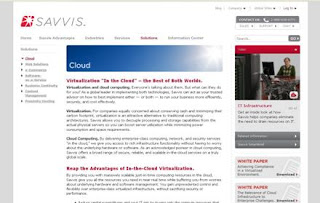 This top 10 list of the best cloud computing service providers will give customers a starting point in their cloud research. We judged these companies on customer traction, innovation and track record.
This top 10 list of the best cloud computing service providers will give customers a starting point in their cloud research. We judged these companies on customer traction, innovation and track record. Keep in mind that this list is flexible. We'll be revisiting it in the months to come, and if a certain provider stumbles, we won't be afraid to drop that company down the list. Similarly, if new providers show up and do a better job than the existing crop, they can bump the old guys off entirely.
Without further ado, here is our list of the top 10 cloud computing providers, as of February 2010.
NewServers: A small concern by many standards, NewServers is unique in this list in that instead of virtual machines, you buy real ones. Sold and paid for just like EC2 or Rackspace Cloud servers (and at similar prices), physical, single servers are brought online by the minute. It's a relief to those concerned with virtualization performance and security, but a head-scratcher for those who equate cloud with virtual computing. Never the less, five minutes and a credit card gets you a server, just like Amazon Web Services. Verizon: The first big telco to enter the cloud, Verizon cornered off a section of its data center in Beltsville, Maryland to offer Infrastructure as a Service to its existing customers. But like all "premium" telco services, it's expensive and doesn't appear to offer more than anyone else. Also, is anyone actually using this yet? We'd love to hear from you. Savvis: Adding true cloud services to its hosting business took Savvis some time, but the company is starting to see revenue as a result. The hoster has focused squarely on security services in the cloud, including virtual machine and network-level security not available from other cloud providers. This could give Savvis an important edge as enterprises move into the cloud. Terremark: The hosting company was first in line for gobs of cash from VMware and signed its platform away to VMware's vCloud Express service. Locking in to VMware's platform could be an advantage, if and when enterprises start buying cloud services. VMware is a household name among most big businesses, and some have proven themselves reluctant to trust cloud providers they do not know. Leaning on VMware's cachet seems like a good bet if you're after large enterprise accounts. GoGrid: Popular with Web startups in the Bay Area, GoGrid has hundreds of customers running Web businesses on its Infrastructure as a Service offering. Fiercely independent, rumor has it the company turned down gobs of funding from VMware to switch its architecture from Xen to VMware's hypervisor technology. Let's hope providing flexibility and choice to customers was the right bet. Joyent: The third largest public cloud infrastructure provider after the Big Two, Joyent puts a friendly face on cloud and remains a strong contender. Joyent, however, might not have the capacity for primetime -- after hosting Twitter during its explosive growth, the two had a surprise breakup last year. The company, however, still counts Facebook and musical legend Prince as customers and retains a certain cachet among the digerati. Microsoft Azure: Still nascent, the Platform as a Service offering holds the promise to let Microsoft shops trickle into Redmond's waiting arms. With the stated goal being that Azure will be as close to developing on Windows Server as possible, along with catholic support for languages and applications, Microsoft will very likely be able to use Azure to continue to dominate its favored markets as it begins to extend into the cloud. Google App Engine: The free-wheeling search giant already has Google Apps, online search and its own verb, but it steps into the provider market with a FOSS-friendly development platform with an absurdly generous usage cap before it begins to charge. Developers are flocking to Google App Engine if only to see what it can do.
Salesforce.com: The Software as a Service giant was quick to see that a few tweaks to its business line would be enough to enjoy the unprecedented explosion of interest in cloud. As it steadily reduces subscription fees in favor of pay-as-you go, its customer relationship management (CRM) services are rapidly approaching bargain-basement cloud expectations. For the gun-shy afraid to develop in the Wild West of Amazon Web Services or Rackspace, the company built Force.com and touts the proprietary development platform as a soup to nuts cloud service.
Rackspace: Demonstrating an agility seldom seen in such a large hosting operation, Rackspace has moved in record time to set up shop in the cloud. Consumers, already able to trust the hoster for traditional iron, have shown no compunctions about jumping in feet first. Open for less than a year, Rackspace's cloud customer count already rivals Amazon's and it's rapidly picking up converts tired of the robotic nature of AWS. Hey, some of us still like talking to real humans.

Amazon: Who else could be in first place? The online retail giant married its astonishingly efficient model of delivering goods around the globe with virtualization, making servers available to anyone anywhere for pennies. Arguably not the first company to apply the concept of cloud computing, Amazon Web Services (AWS) is by far the most successful, and even if selling servers is only a fraction of its business, it's years ahead of anyone else in maturity and customer awareness.










thanks for the details review on top 10 cloud services providers. I also found this url useful:
ReplyDeleteTOP 10 cloud services providers
This comment has been removed by the author.
ReplyDelete